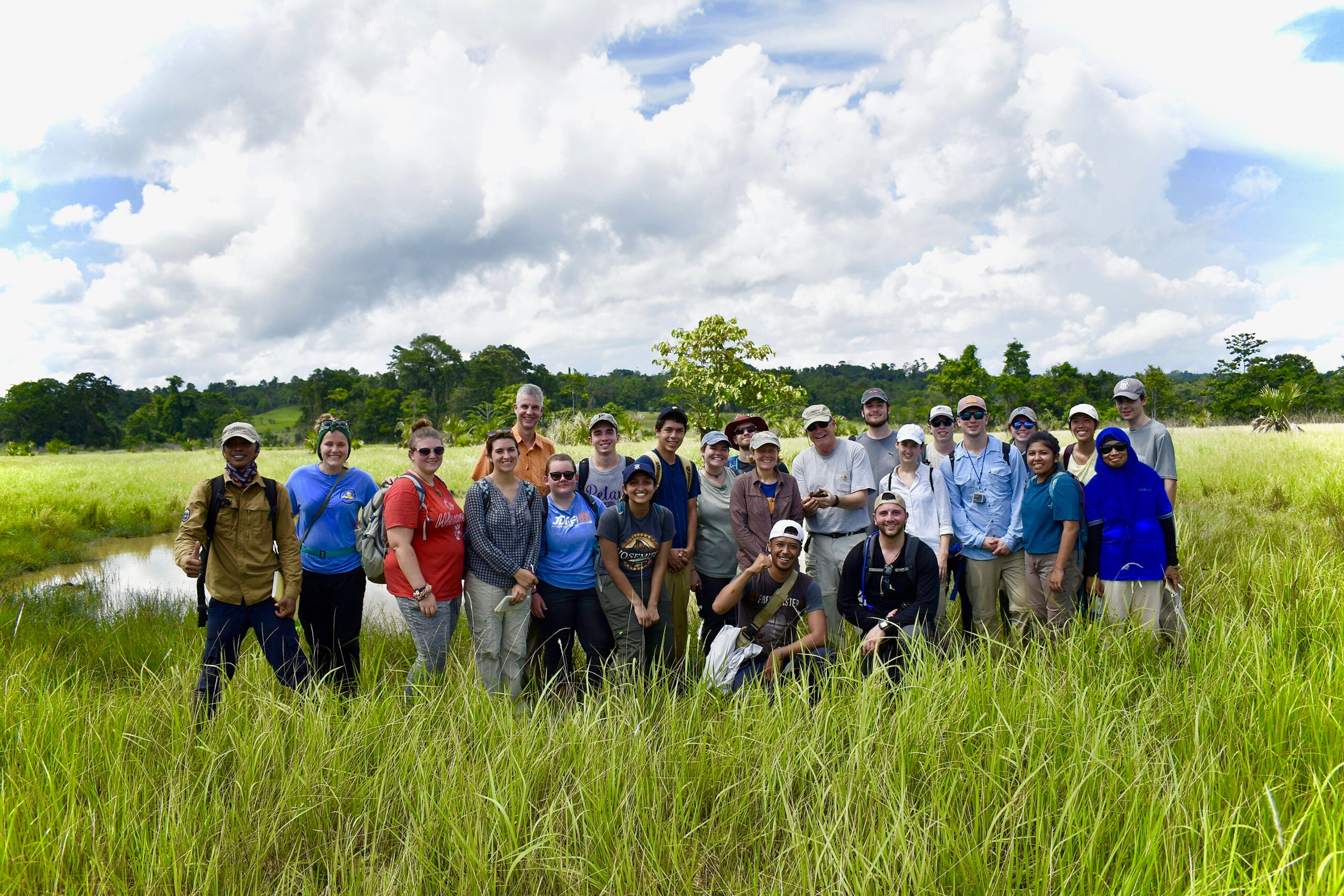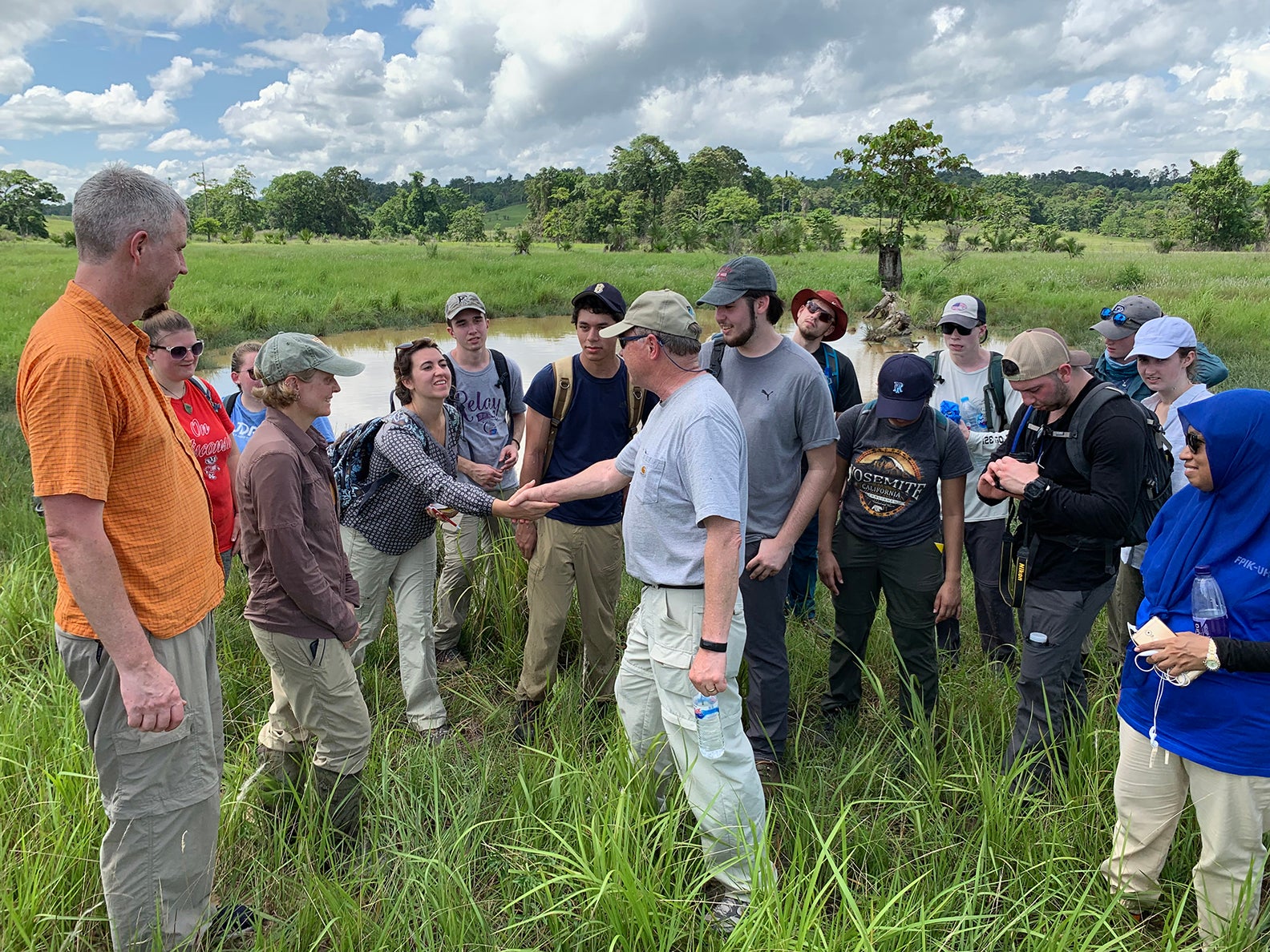KINGSTON, R.I. – February 1, 2019 – When 17 students set out for a J-Term trip to Indonesia with Professors Tom Boving and Nancy Karraker to learn about geology, hydrology, biodiversity conservation and the struggle to preserve traditional ways of life in a developing nation, they knew they were in for some surprises. Among some of those surprises: seeing vulnerable and endangered species up close; viewing what may have been one of the oldest cave paintings still in existence; and teaching their university president how to trap and tag turtles in a lowland swamp.
This was the sixth trip led by Boving and Karraker together as a team to Indonesia. They were joined on the 15-day expedition by a University of Rhode Island graduate now studying in Yogyakarta, Indonesia.
The trip began on the beaches of Bali with students conducting surveys of the landscape to gain a better understanding of marine beach pollution. Even in the most remote areas of beach – generally characterized as “paradise” to the general public – students found trash, floating plastics, glass and debris, not only on the beach but beneath the sand, carried there via ocean currents from as far away as India.

“We have done this every year and it is always an eye opener for students,” Karraker said. “They can’t imagine it is going to be this way.”
Students also met with representatives of a local non-governmental organization who explained the difficulty of balancing economic pressures with the impact of development and tourism on the environment, while trying to preserve a traditional way of life.
“We were able to help give students a better understanding of what is typical for many places in the developing world, where very rapid growth goes hand in hand with environmental degradation,” Boving said.
From Bali, the group headed to Rawa Aopa Watumohai National Park in Southeast Sulawesi where they worked with national park biologists and guides to study biodiversity and ecosystems – from mangrove, lowland swamp and savanna to mountain jungles. Part of this included trapping, tracking and studying the Southeast Asian box turtle, one of the most heavily traded turtles in the world.
To their surprise, University President David M. Dooley, who was in Indonesia meeting with U.S. and Indonesian officials, made a special trip to the park to meet the students for their field work and to experience first-hand the challenges of learning in a remote environment.
“This was a three-and-a-half-hour trip each way after a two-hour flight, without the benefit of much infrastructure on the way – so not an easy trip,” Karraker said.
This was the first time that Dooley, who has traveled all over the world on behalf of the University, was able to visit with students on an international J-Term trip and he was committed to making it happen. Dooley was excited about the opportunity to meet with students and to have them teach him what they had learned. Having been trained earlier in the day, the students taught Dooley how to trap, tag, measure and determine the age and sex of the turtles. Students also learned to track turtles in the field to record movement patterns between swamp, forest and savanna.
Students loved the idea of meeting Dooley in such an environment and were excited about the chance to teach him something and learn alongside him.
“President Dooley made it very clear that he didn’t want to be treated like the president of the university, he wanted to get his hands dirty,” said Matt Palasciano ’20. “It was a really great experience. We were able to talk with locals, embrace the culture and learn so much – both from our work in the field and by taking advantage of the different academic backgrounds within our own group.”
Students were also able to hear about coral reef restoration from representatives of the Mars Foundation and go snorkeling with their guides to witness the seeding of live coral and how reefs are being restored. On their return to Bali, students learned about the local rice ecology, the knowledge and engineering skills necessary to grow a successful crop in a variable climate for thousands of years and how development and the growth of the tourism industry have affected that. By small traditional boat, they explored one of the largest remaining mangrove forests in Indonesia and also had the opportunity to examine some of the newest rock on earth while exploring a live volcano.
Explaining the number and variety of activities in the trip itinerary, Karraker stated, “We do a lot of moving around on J-Term but we do it on purpose, because it really gives students a chance to see and learn about a range of cultures and traditions and ecosystems.”
“Students from past J-Terms have told us the trip was life changing,” Boving added. “These are experiences you just cannot get in a classroom.”

